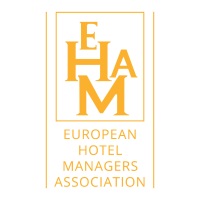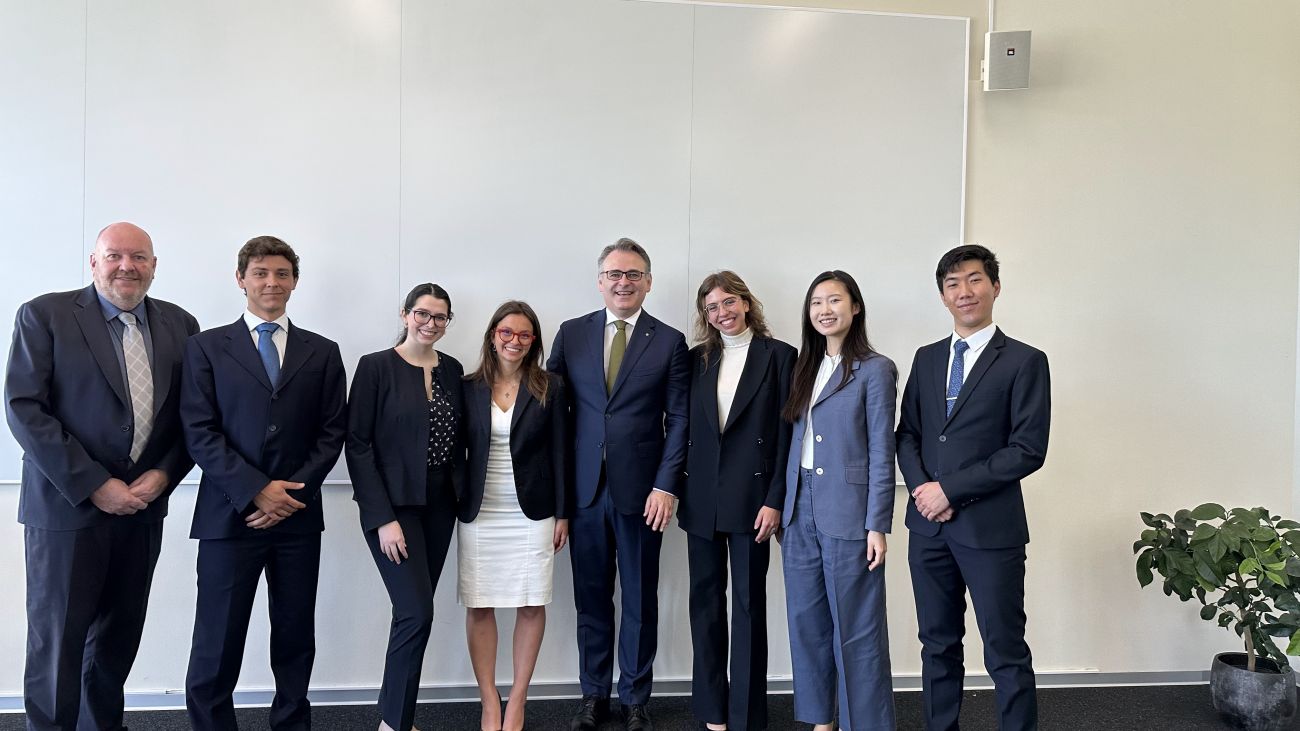
EHMA AND EHL HOSPITALITY BUSINESS SCHOOL TOGETHER TO CONSOLIDATE ESG PRACTICES
The prestigious European Hotel Managers Association (EHMA) has collaborated with students from EHL Hospitality Business School on a responsible and practical project |
 |
EHMA AND EHL HOSPITALITY BUSINESS SCHOOL TOGETHER TO CONSOLIDATE ESG PRACTICES
The prestigious European Hotel Managers Association (EHMA) has collaborated with students from EHL Hospitality Business School on a responsible and practical project |
Catégorie : Europe - Économie du secteur
- Associations et Syndicats
Article rédigé par Vanessa Guerrier-Buisine le 18-07-2023
 Left, Ian Millar, centre, Pawel Lewtak, and the six students from EHL Hospitality Business School
Crédit photo © European Hotel Managers Association / EHL Hospitality Business School
Six students from the EHL Hospitality Business School (Jia Hua, Cecilia Diaz Peschard, Danai Nasoula, Hou Lai Chan, Sasha Tsimaratos, and Vasiliki Mamidaki Venetopoulou) worked tirelessly and extensively to create a toolbox, a genuine Swiss army knife for responsible hoteliers. The alchemy between the students' fresh perspective and creativity and the operational experience of the hotel professionals involved in the project was perfect. The result is the ESG toolkit for general managers, with more than 80 best practices identified to support hoteliers throughout the process.
The successfulness of the project lies not only in the participation and total commitment of the students. It is also based on the combined efforts of Ian Millar, lecturer in hospitality industry at EHL, Cassie Schmutz, head of the student education project at EHL, and all the general managers involved in the project.
Le Journal des Palaces wanted to have a closer look at this experiment and find out more about the results achieved. Pawel Lewtak, Vice President of EHMA and national delegate for Central Europe, spoke to us about this exceptional partnership between EHL and EHMA.Journal des Palaces: Could you tell us about the origins of the collaborative project between students at EHL Hospitality Business School and EHMA about ESG?Pawel Lewtak: At the very core of our EHMA’s agenda as the preferred Association of Hotel Managers is to collaborate with leading hotel schools such as EHL. We are determined to share the collective expertise of our members, showcasing real-world best practices that can enrich the educational experience for students and faculty.
Each year, we come up with ambitious and relevant projects that align with the buzzwords of the hospitality industry. In 2023, it is indeed challenging to ignore that ESG (Environmental, Social, and Governance) is gaining significant momentum across different industries, including the hospitality sector. It was the unanimous decision for the EHMA Executive Committee to commission a project for EHL students devoted to ESG.
Despite the fact that ESG compliance mounts pressure on hotel business teams to follow robust ESG frameworks and requirements, it is important to note that there is no golden standard available yet, which created the opportunity for the EHL bright minds to tap into the available resources and deliver “ESG Toolkit – Driving ESG in Hospitality: Insights, Challenges, and Solutions for EHMA members”.
The freedom provided to the students allowed them to showcase their creativity, innovation, and critical thinking skills. It encouraged open dialogue, stimulated constructive feedback, and the exchange of ideas among the students and the attending EHMA stakeholders. This collaborative spirit fostered a rich and dynamic learning experience for all parties involved.
EHL: There has been a long-standing partnership between both parties for nearly 20 years. EHMA members actively recruit EHL students and graduates, and EHL has provided educational content for EHMA members in the past. This has been a very successful partnership, benefiting both sides. This project, the Student Business Project (SBP) was a logical next step in that partnership. EHL has for a while wished to have a student project with EHMA, and this semester we managed to get that organized and a very important subject to all EHMA members.Could you cite a few concrete examples from the toolbox that resulted from this work?Pawel Lewtak: In my opinion, the bread and butter of the ESG Toolkit project lies in the collection of over 80 best practices. Depending on the specific context and needs of the hotel our association members manage, they can select and prioritize the practices that correlate best with the goals and values of their organizations.
I was personally inspired by the toolkit section devoted to incorporating mindfulness, well-being and fostering a positive work environment (Social in ESG). Without giving specific hotel brands, which implemented brilliant ideas and exceptional social innovations, I saw how to face the challenges positively related to the shortage of talent in our hotels. Multi-faceted approach exemplified in the ESG framework may serve as a perfect remedy to the human resources issues in our hotels. Combining these strategies with continuous monitoring and adjustment based on the ESG metrics can help hospitality management effectively overcome talent shortages in the long run.
Another tool provided in the ESG report, which is useful and readily to be implemented, is an ESG annual survey to be conducted to measure the team’s commitment and knowledge of the ESG-related programs. As part of the holistic approach aiding in the reiterative process, this tool is meant to be used by general managers and their leadership teams at the start and end of each financial year. The aim is to allow managers to identify the key ESG areas to focus on and hold them accountable at year’s end. It is meant to be quantitative and qualitative to encourage more meaningful reflection on the ESG efforts taken and begin an honest conversation on how to improve their ESG strategy.
These best practices may provide a foundation for ESG projects to create a positive change and drive sustainability in our current operational environment. Needless to say, it is important to customize and adapt applicable practices to the specific needs and context of each project, considering the unique industry, location, and stakeholders involved.
EHL: The toolkit provides a comprehensive overview of ESG (Environmental, Social, and Governance) to enhance understanding in the hospitality industry. It covers the significance of ESG, rules, and regulations and includes a section on change management for effective implementation. Practical examples and ideas are emphasized, drawing on EHMA's best practices and global case studies.
It incorporates monitoring tools to track progress, including surveys to identify priority trends and measure employee sentiment. Over 80 real-life examples of ESG initiatives, focusing on key trends such as Net Carbon Zero, Waste Management, Employee Well-Being, Community Engagement, and Transparency in Reporting, are also included.What feedback have you received from the students who took part in this project?Pawel Lewtak: I had the privilege to be on campus in Lausanne and spent some time with the students. It was great to hear that they were enjoying the ESG project, which happened to be their final presentation before graduation. We should not forget that they worked not only under stress, but also under a strict academic curriculum. They were expected to present all they had learned in the academia during years of studying in EHL and apply the knowledge in the real-life scenario.
From what I saw, they appreciated the fact that the project they decided to give so much time and energy to was both relevant to the client and applicable for over 400 hotel association members. It was evident that the connection between theory and practice made the project more engaging and meaningful for all the team members.
It is important to acknowledge that the students showed their maturity in the way they built the team to get the most of the different backgrounds and levels of specialities. It was fun to watch that working on this project built strong relationships and bonds among the team members.
Students from EHL: We were thrilled to have the opportunity to work on the innovative ESG project, knowing its positive implications for society and the environment. As aspiring professionals, we recognize the significance of ESG as a driving force shaping tomorrow's landscape. The project's relevance to our future careers and its focus on hospitality made it a very fulfilling endeavour for us.
Our collaboration with EHMA has been a wonderful experience. Throughout the entire process, EHMA remained actively involved, generously sharing their feedback and granting us access to their valuable resources. Their involvement and timely responses were instrumental in driving the project forward and ensuring its success.What feedback have you received from the General Managers who have access to the ESG toolbox?Pawel Lewtak: All the general managers were incredibly impressed with the ESG toolkit project carried out by the talented students from EHL. It is because they demonstrated a thorough understanding of the hospitality industry’s challenges and the importance of integrating environmental, social, and governance principles into our operations. Their project provided valuable insights and a comprehensive toolkit that has proven instrumental in guiding our hotel’s ESG initiatives.
The extensive number of over 40 interviews conducted by the students with hotel managers, HR executives and experts proves their determination to gather diverse viewpoints and capture a comprehensive grasp of the threats and opportunities faced by general managers with ESG practices. Their willingness to invest the time and effort required to arrange, conduct, and document these interviews is truly commendable.
It is worth noting that those students stepped into the operational shoes of general managers. The toolkit content is both informative and concise, which is highly beneficial, especially considering the time constraints faced by busy professionals like general managers.
It is easy to extract complex information into a user-friendly format without overwhelming the reader. The hyperlinks within the document lead to external websites, academic articles, research papers, industry reports, or relevant case studies. These sources provide readers with an expanded understanding of the topic, enabling them to gain deeper insights, explore different perspectives, and access the latest developments in ESG practices within the hospitality industry.
EHL: Although the ESG toolkit is still awaiting distribution among EHMA members, it has already incorporated valuable input and feedback from over 40 General Managers (GMs) and Human Resource Managers (HRMs) representing various hotels and EHMA members. This collaborative effort ensures that the toolkit is practical, user-friendly, and tailored to meet their specific needs and preferences.
During the interviews, there was a unanimous agreement on the importance of the ESG toolkit and highlighted the need for a comprehensive tool like this in the hospitality industry to help illustrate what can be done. We eagerly await the member’s access to the toolkit and look forward to hearing their feedback once they have had the opportunity to use it.Would you like to do it again?Pawel Lewtak: Given the students’ impressive performance and the quality of their work, we, as EHMA, express our willingness and enthusiasm to continue working with EHL students on future projects or initiatives. We believe that their knowledge, fresh perspectives, and commitment to excellence can further nurture our partnership.
For our association, this strategic collaboration is seen as a two-way transmission line, from which both parties benefit. Our association has the privilege of working with brilliant students and faculty members who offer innovative ideas and forward-thinking within the rapidly evolving hospitality industry. On the other hand, by engaging with EHMA members, the EHL students gain access to the current industry insights, and a network of seasoned hospitality professionals. Working on a project allows them to bridge the gap between academia and industry, enhancing the quality of education, and preparing them for successful careers in the future.
|
|





